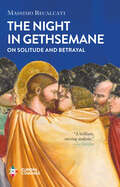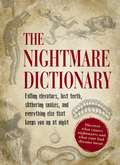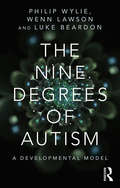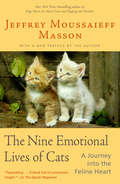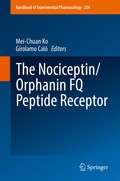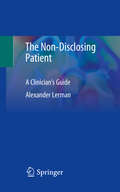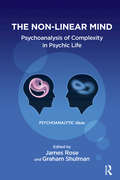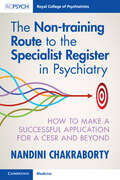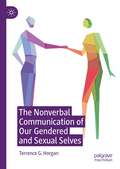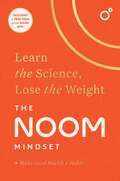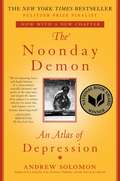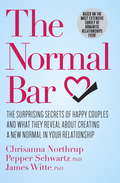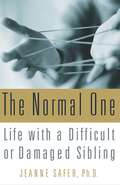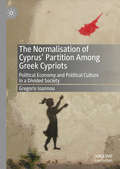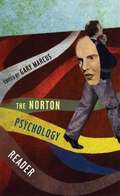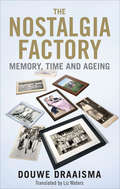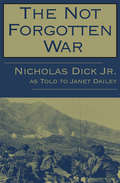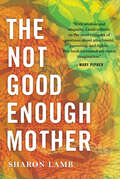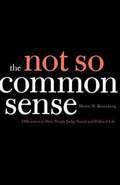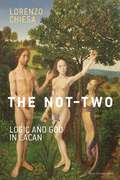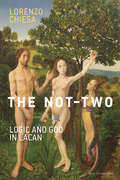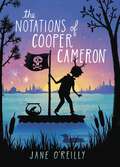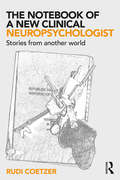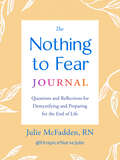- Table View
- List View
The Night in Gethsemane: On Solitude and Betrayal
by Massimo RecalcatiThe highly regarded Italian philosopher and psychoanalyst offers “a brilliant, stirring analysis” on suffering, doubt, and the potential for renewal (La Stampa, IT).For Massimo Recalcati, Jesus’s reckoning in the Garden of Gethsemane is at once an instance of human weakness and an encounter with the Divine. It is the story where the Divine and the Human meet most forcefully, first in company, then in solitude, and where agony and doubt mingle with potential rebirth and revitalization.As the Gospels recount, after the Last Supper, Jesus retreated to a small field just outside the city of Jerusalem: Gethsemane, the olive grove. His prayers are interrupted when Judas arrives with a group of armed men, and kisses him, betraying and abandoning him with a kiss. Jesus is forsaken by his friends and, it seems to him in this moment, by his father, his God. His sin, in Recalcati’s view, is like Prometheus to have drawn Divine closer to man.“Lively and sharp . . . an invitation to look positively at the loneliness of human experience.” —Lettera, IT
The Nightmare Dictionary
by Adams MediaDecode your darkest dreams! Whether you're spitting out teeth, plummeting from a ten-story building, or standing in a public place completely naked, nightmares always leave you in a cold sweat, wondering what just happened and what it all means. The Nightmare Dictionary helps you unlock the mystery behind your bad dreams. This book features fascinating interpretations for more than 300 of the most common nightmare images, as well as information about the different types of dreams. From spiders and illness to broken bones and hurricanes, you'll not only figure out what these haunting dream symbols mean, but also why they keep you up at night. With The Nightmare Dictionary, you'll discover all the eerie warnings, premonitions, and fears that are constantly brewing in your dreams.
The Nightmare Dictionary: Discover What Causes Nightmares and What Your Bad Dreams Mean
by Media AdamsDecode your darkest dreams!Whether you're spitting out teeth, plummeting from a ten-story building, or standing in a public place completely naked, nightmares always leave you in a cold sweat, wondering what just happened and what it all means.The Nightmare Dictionary helps you unlock the mystery behind your bad dreams. This book features fascinating interpretations for more than 300 of the most common nightmare images, as well as information about the different types of dreams. From spiders and illness to broken bones and hurricanes, you'll not only figure out what these haunting dream symbols mean, but also why they keep you up at night.With The Nightmare Dictionary, you'll discover all the eerie warnings, premonitions, and fears that are constantly brewing in your dreams.
The Nine Degrees of Autism: A Developmental Model for the Alignment and Reconciliation of Hidden Neurological Conditions
by Philip Wylie Luke Beardon Wenn LawsonThe Nine Degrees of Autism presents a much-needed positive tool for understanding the developmental process of autism, and to facilitate the improved mental health and well-being of individuals on the spectrum. The ground-breaking model charts nine distinct stages of development - from pre-identification, to learning to live with changes in self-image following a late diagnosis, through to self-acceptance and wellbeing. Using the model as a framework each chapter focuses on a particular stage of the process. Experts provide personal insights into the environmental and societal challenges faced by individuals with autism, and dispel a number of popular misconceptions. The positive developmental model described in this book will encourage people on the Spectrum to accept themselves by focusing on their gifts rather than weaknesses, and to avoid identifying with negative medical classifications. The developmental process which the authors describe is also applicable to other ‘hidden’ neurological conditions such as Dyslexia, Dyspraxia, Aphasia, and ADHD. The book should be read by anyone who wants to understand the real nature and experience of autism and will also be essential reading for a range of professionals seeking to work more effectively with individuals on the spectrum.
The Nine Emotional Lives of Cats: A Journey Into the Feline Heart
by Jeffrey Moussaieff MassonIn the hugely popular New York Times bestseller, Dogs Never Lie About Love, provocative psychoanalyst Jeffrey Moussaieff Masson brilliantly navigated the inner landscape of “man’s best friend.” Now he delves deep into the secretive, playful world of cats, revealing emotions, debunking myths, and honoring the feline’s evolution from solitary jungle creature to human companion. Drawing from literature, history, animal behavioral research, and the wonderful true stories of cat experts and cat lovers around the world, Jeffrey Masson vividly explores the delights and mysteries of the feline heart. But at the core of this remarkable book are Masson’s candid, often amusing observations of his own five cats. Their mischievousness, aloofness, and affection provide a way to examine emotions from contentment to jealousy, from anger to love. Consider the question: Are cats selfish? While human egocentricity is defined by how little a person cares about others, the cat’s narcissism is not like that at all. Cats may appear self-centered, but they watch us all the time, taking us in. They see us; they notice us–a far cry from vanity.Cats are curious, a trait that rarely kills them. On the contrary, it gives them the chance to assess, in their own idiosyncratic way, whether we are worthy of their attention. Cats are happy to be themselves. What they think of us is a different question entirely. “We need cats to need us,” notes Masson, “It unnerves us that they do not. However, if they do not need us, they nonetheless seem to love us.”The Nine Emotional Lives of Cats will captivate readers with its surprises and insights, offering a new perspective on the deep connection shared by humans and their feline friends. This is the book that Masson’s many fans and cat lovers everywhere have been waiting for.
The Nociceptin/Orphanin FQ Peptide Receptor (Handbook of Experimental Pharmacology #254)
by Mei-Chuan Ko Girolamo CalóThe aim of this book is not only to introduce readers with a broad spectrum of biological actions of the NOP receptor, but also to feature a detailed look at the N/OFQ-NOP receptor system, medicinal chemistry, pharmacology, and clinical data of NOP-targeted ligands. This special volume book - for the first time focusing on the NOP receptor - is designed to serve as a useful reference, stimulate more research on the N/OFQ-NOP receptor system, and lead to more development of NOP-related ligands for several therapeutic applications.
The Non-Disclosing Patient: A Clinician's Guide
by Alexander LermanThis volume is to examine the phenomena of non-disclosure in its wide ranging forms, study its properties, and to deepen the capacity of a mental health professional --as well as all clinicians who provide mental health counseling -- to detect and engage it across a range of clinical settings. Unengaged, sustained DNDD represents an impasse that is destructive to a clinician’s capacity to both understand and treat a patient. Successfully engaged, on the other hand, DNDD offers a unique perspective on in individuals anxieties, presuppositions, and mental functioning. A clinician who is both aware that a patient is withholding information, and comfortable with that awareness, may approach the patient material while listening for both indications of non-disclosed material and—critically—a growing awareness of psychopathology or other motivational forces driving non-disclosure.Written by experts in this area from both adult and child psychiatric specialties, this book is the first to address the issue of DNDD and present clinical pearls for addressing it. This text is a valuable resource for psychiatrists, psychologists, addiction medicine specialists, family physicians, and a wide array of clinicians treating patients who may struggle with disclosure and integrity.
The Non-Linear Mind: Psychoanalysis of Complexity in Psychic Life (The\psychoanalytic Ideas Ser.)
by James RoseThis book is concerned with whether we can develop our understanding of the mind through the application of new approaches to the study of complex systems. It is divided into two sections. The first is concerned with the application of non-linear systems theory to the psychoanalytic study of the mind. The second is concerned with the technical application of the ideas of chaos theory to the understanding of therapeutic action and psychic change. It concludes with a consideration of the research and clinical implications of considering the mind as a non-linear system.
The Non-training Route to the Specialist Register in Psychiatry: How to Make a Successful Application for a CESR and Beyond
by Nandini ChakrabortySubstantive consultants in the UK need to be on the GMC specialist register. Non-consultant psychiatrists might work towards the GMC specialist register in psychiatry through various routes, of which CESR is one. This book, written by experts with first-hand experience, provides guidance to doctors planning to use this route. Specialist registration is the acknowledgement of a doctor's expertise in their field and the achievement of competences as outlined in specialist curricula. This book provides a succinct overview of what to expect from the process of applying for CESR, with practical advice on how to submit a successful application. It will appeal primarily to Speciality and Associate Specialist (SAS) Doctors with extensive experience in psychiatry, psychiatrists who have completed their training overseas and wish to practice in the UK, as well as medical managers and educators supporting their workforce towards consultant grade.
The Nonverbal Communication of Our Gendered and Sexual Selves
by Terrence G. HorganThis book provides a comprehensive guide to the latest research on the nonverbal cues that signal our biological sex, gender, and sexual orientation to others, as well as our sexual/romantic interest in others. Crucially, it is a volume which incorporates critical perspectives which help to tackle the short-comings associated with the predominant focus on cis-gender, heterosexual individuals . It underscores how specific cues work in conjunction with other cues during the communication of our gendered and sexual selves, and how various factors (cultural, contextual, social, personality variables) impact that process. It also addresses common misconceptions including the notion that the romantic landscape has become more sexualized and predominantly technology driven. This book highlights that we still tend to communicate a romantic interest in each other in quite traditional places, such as school, home, and social events, using tried-and-true nonverbal cues, like gazing and smiling. Across six chapters readers will learn about the cues to our gendered and sexual selves, which exist in our facial and bodily movements, dress, personal artifacts, gestures, body odor, vocal characteristics, touch, and posture, amongst others. This engaging work presents historical and contemporary research findings that will appeal to students and scholars of nonverbal communication, communication studies, the psychology of gender, and sexuality studies.
The Noom Mindset: Learn the Science, Lose the Weight
by NoomNoom&’s first-ever (and only!) official book!When it comes to setting and achieving your goals, how you think influences what you do. Whether developing a sustainable relationship with food, jump-starting a new fitness routine to shoot for a certain number on the scale, or tackling a health issue, mindset is key to meeting your goals—but it can also often be the most neglected element in any attempt to change behavior. While you might know what you want to do, the key to success is understanding why you want to do it, and how you make a plan that works for you in the long term. The Noom Mindset, created by the leading digital health company that has helped millions achieve their weight and health goals, deconstructs habits around the core drivers of body weight: what we eat and how much we move. You&’ll discover how your habits around eating and weight management are impacted by your own self-confidence, stress, habits, lifestyle choices, and the rollercoaster of motivation (yes, it&’s supposed to go up and down). Best of all, you&’ll learn skills that can be applied to any behavior you want to change, habit you want to break, or life you want to create. This book is an instruction manual for achieving sustainable lifestyle changes plus many other health-related outcomes, including weight loss. With The Noom Mindset, you&’ll learn how to: -Cultivate a growth mindset -Master the forging or deconstructing of behavior chains -Overcome thought distortions -Generate meaningful internal motivation for staying focused on your goals -Create changes that stick Based on more than a decade of research and experimentation, Noom has helped millions of users succeed by employing the mindset tactics that this book teaches. Written with an emphasis on self-awareness, goal-setting, and self-experimentation, The Noom Mindset provides powerful tools to help you reach your goals, your way.
The Noonday Demon: An Atlas Of Depression
by Andrew SolomonWith uncommon humanity, candor, wit, and erudition, award-winning author Andrew Solomon takes the reader on a journey of incomparable range and resonance into the most pervasive of family secrets. His contribution to our understanding not only of mental illness but also of the human condition is truly stunning.<P><P> The Noonday Demon examines depression in personal, cultural, and scientific terms. Drawing on his own struggles with the illness and interviews with fellow sufferers, doctors and scientists, policymakers and politicians, drug designers and philosophers, Solomon reveals the subtle complexities and sheer agony of the disease. He confronts the challenge of defining the illness and describes the vast range of available medications, the efficacy of alternative treatments, and the impact the malady has had on various demographic populations around the world and throughout history. He also explores the thorny patch of moral and ethical questions posed by emerging biological explanations for mental illness.<P> The depth of human experience Solomon chronicles, the range of his intelligence, and his boundless curiosity and compassion will change the reader's view of the world.
The Normal Bar: The Surprising Secrets of Happy Couples and What They Reveal About Creating a New Normal in Your Relationship
by Pepper Schwartz Chrisanna Northrup James WitteBased on data obtained from nearly 100,000 respondents, here is the ultimate resource for anyone who wants to learn the relationship-tested ways couples can achieve satisfaction and contentment in areas such as communication, sex, affection, and financial cooperation.What constitutes "normal" behavior among happy couples? What steps you should take if that "normal" is one you want to strive for? To help answer those questions, wellness entrepreneur Chrisanna Northrup teamed with two of America's top sociologists, Yale Ph.D. Pepper Schwartz and Harvard Ph.D. James Witte, to design a unique interactive survey that would draw feedback from around the world. What has resulted is the clearest picture yet of how well couples are communicating, romancing each other, satisfying each other in the bedroom, sharing financial responsibilities, and staying faithful - or not. Since the Normal Bar survey methodology sorts for age and gender, racial and geographic differences and sexual preferences, the authors are able to reveal , for example, what happens to passion as we grow older, which gender wants what when it comes to sex, the factors that spur marital combat, how kids figure in, how being gay or bisexual turns out to be both different and the same, and -regardless of background -- the tiny habits that drive partners absolutely batty.The book is dense with revelations, from the unexpected popularity of certain sexual positions, to the average number of times happy - and unhappy -- couples kiss, to the prevalence of lying, to the surprising loyalty most men and women feel for their partner (even when in a deteriorating relationship), to the vivid and idiosyncratic ways individuals of different ages, genders and nationalities describe their "ideal romantic evening."Much more than a peek behind the relationship curtain, The Normal Bar offers readers an array of prescriptive tools that will help them establish a "new normal." Mindful of what keeps couples stuck in ruts, the book's authors suggest practical and life-changing ways to break cycles of disappointment and frustration.
The Normal One: Life with a Difficult or Damaged Sibling
by Jeanne SaferIn the first book of its kind, renowned psychotherapist Jeanne Safer examines the hidden trauma of growing up with an emotionally troubled or physically disabled sibling, and helps adult "normal" siblings resolve their childhood pain.For too long the therapeutic community has focused on the parent-child relationship as the primary relationship in a child's life. In The Normal One, Dr. Safer shows that sisters and brothers are just as important as parents, and she illuminates for the first time the experience of being "the normal one."Drawing on more than sixty interviews with normal, or intact, siblings, Safer explores the daunting challenges they face, and probes the complex feelings that can strain families and damage lives. A &“normal&” sibling herself, Safer chronicles her own life-shaping experiences with her troubled brother. She examines the double-edged reality of normal ones: how they both compensate for their siblings&’ abnormality and feel guilty for their own health and success. With both wisdom and empathy, she delineates the &“Caliban Syndrome,&” a set of personality traits characteristic of higher-functioning siblings: premature maturity, compulsion to achieve, survivor guilt, and fear of contagion.Essential reading for normal ones and those who love them, this landmark work offers readers insight, compassion, and tools to help resolve childhood pain. It is a profound and eye-opening examination of a subject that has too long been shrouded in darkness.
The Normalisation of Cyprus’ Partition Among Greek Cypriots: Political Economy and Political Culture in a Divided Society
by Gregoris IoannouThis book explores the basic dynamics that shaped the Cyprus problem, with a focus on recent decades. The author deals with the periods, nodal points and fields that produced the conditions for the normalisation of partition and also presents the Cyprus problem as viewed from the outside. The chapters approach Cyprus’ division in light of power relations in society, the interaction between the political elite and society, and discuss the political and ideological dynamics as manifested in the public sphere. While analysing primarily the Greek Cypriot community, the book also refers to parallel developments in the Turkish Cypriot and international communities, arguing that the normalisation of Cyprus’ partition is rooted in the political economy and political culture of Greek Cypriots. At the same time, from the perspective of the peace and reunification movement, this is an inherently contradictory and potentially unstable process that can be overturned.‘Α remarkably thorough study focusing on nationalist narratives, political and media discourses and socio-economic structures in Cyprus and their impact on the formation and transformation of political identities since the 1950s. Unlike many other books on the issue, Ioannou analyses social and political developments in both the Greek-Cypriot and the Turkish-Cypriot communities. This approach sheds light on the internal reasons of the perpetuation of the island’s division, which the geopolitical and international relations approaches alone miss to grasp. Combining the analytical skills of a political scientist and his personal experience as an engaged citizen in favour of unification, Ioannou offers significant insight on a complex and traumatic conflict that remains one of Europe’s black spots.’ –Athena Skoulariki, Assistant Professor in Sociology of Communication, Discourse Analysis and Social Representations, University of Crete, Greece ‘The basic argument of the book is that the consolidation of partition was neither automatic nor happened behind the backs of Greek Cypriots. The very interesting and demythologising work of Gregoris Ioannou brings to light a hidden, but common secret of the Greek Cypriots.’ –Alexis Heraklides, Emeritus Professor of International Relations, Panteion University, Greece ‘Ioannou projects a multi-focal spotlight on the Cyprus problem, so as, at least for the careful reader, this becomes not only an interesting topic in itself, but, also a cognitive springboard from which to understand broader pathogenies of our common social and political life.’ –Seraphim Seferiades, Associate Professor in Political Science, Panteion University, Greece
The Norton Psychology Reader
by Gary MarcusOffering a sampling of psychology's diversity, Marcus (psychology, New York U.) includes two or three reprinted selections in each of 17 sections he introduces, from the field's pioneers and methods to current drug and cognitive therapy. Other topics cover the mind and brain, motivation, stress, personality and culture. Some chapters include critical thinking questions.
The Nostalgia Factory: Memory, Time and Aging
by Douwe Draaisma&“An entertaining discussion&” of the role memory plays in our lives as we age, including an interview with Oliver Sacks (Times Higher Education Supplement). When we can&’t call to mind the name of someone we&’ve known for years, or walk into a room and forget what we came for, we start worrying. Are these lapses just &“senior moments,&” or something serious like dementia? In this book, a renowned specialist explores the topic of memory in later life—not only the problems but the surprisingly unexpected pleasures it can offer, such as the &“reminiscence effect.&” Avoiding jargon, Douwe Draaisma explains neurological phenomena and also includes a long interview with Oliver Sacks, who speaks of his own memory changes as he entered his sixties. Draaisma moves smoothly from anecdote to research and back, weaving stories and science into a compelling description of the terrain of memory and forgetfulness, dismantling myths and helping us to value the abilities of the aging mind. &“For readers, the most welcome aspect of this book may be his heartening examples of the wisdom that comes with old age.&”—The Washington Post &“He engages with topics of considerable social and psychological importance…his use of varied sources is refreshing.&”—Times Higher Education Supplement
The Not Forgotten War
by Nicholas Dick Jr.The Not Forgotten War chronicles the experiences of Private Nicholas Dick, who served in a machine gun crew during the last few months of the Korean conflict. Those last months were among the bloodiest, as both sides fought to claim as much territory as possible prior to reaching a cease-fire agreement. For years after his discharge, Nick was never able to talk about his horrific experiences and never mentioned the frequent nightmares he suffered. After a job injury forced him to take early retirement, he suddenly found himself becoming a victim of post-traumatic stress syndrome. Here is one GI&’s story of war and its aftermath.
The Not Good Enough Mother
by Sharon LambA psychologist who evaluates the fitness of parents when their children have been removed from their custody finds herself reassessing her own mothering when her son falls victim to the opioid crisis.Psychologist and expert witness Dr. Sharon Lamb evaluates parents, particularly in high-stakes cases concerning the termination of parental rights. The conclusions she reaches can mean that some children are returned home from foster homes. Others are freed for adoption. Well-trained, Lamb generally can decide what's in the best interests of the child. But when her son's struggle with opioid addiction comes to light, she starts to doubt her right to make judgments about other mothers.As an expert, a professor, and a mother, Lamb gives voice to the near impossible standards demanded by a society prone to blame mothers when anything befalls their children. She describes vividly the plight of individual parents, mothers in particular, struggling with addiction and mental illness and trying to make stable homes for their kids amid the economic and emotional turmoil of their lives--all in the context of the opioid epidemic that has ravaged her home state of Vermont. In her office, during visits with their children, and in the family court, the parents we meet wait anxiously for Lamb's verdict: Have they turned their lives around under child welfare's watchful eye? Do they understand their children's needs? In short, are they good enough? But what is good enough? Lamb turns that question on herself in the midst of her gradual realization of her son's opioid addiction. Amazed at her own denial, feeling powerless to help him, Lamb confronts the heartache she can bring into the lives of others and her power to tear families apart.
The Not So Common Sense: Differences in How People Judge Social and Political Life
by Shawn W. RosenbergIn this fascinating interdisciplinary book, Shawn W. Rosenberg challenges two basic assumptions that orient much contemporary social scientific thinking. Offering theory and empirical research, he rejects the classic liberal view that people share a basic "common sense" or rationality. At the same time, he questions the view of contemporary social theory that meaning is simply an intersubjective or cultural product. Through in-depth interviews, Rosenberg explores the underlying logic of cognition. Rather than discovering a common sense or rationality, he finds that people reason in fundamentally different ways, and these differences affect the kind of understandings they craft and the evaluations they make. As a result, people actively reconstruct culturally prevalent meanings and norms in their own subjective terms. Rosenberg provides a comprehensive description of three types of socio-political reasoning and the full text of three exemplary interviews. Rosenberg's findings help explain such puzzling social phenomena as why people do not learn even when it is to their advantage to do so, or why they fail to adapt to changed social conditions even when they have clear information and motivation. The author argues that this kind of failure is commonplace and discusses examples ranging from the crisis of modernity to the classroom performance of university students. Building on the ideas of Jean Piaget, George Herbert Mead, and Jurgen Habermas, Rosenberg offers a new orienting vision, structural pragmatics, to account for these social phenomena and his own research in cognition. In the concluding chapter, he discusses the implications of his work for the study of social cognition,political behavior, and democratic theory.
The Not-Two: Logic and God in Lacan
by Lorenzo ChiesaIn The Not-Two, Lorenzo Chiesa examines the treatment of logic and God in Lacan's later work. Chiesa draws for the most part from Lacan's Seminars of the early 1970s, as they revolve around the axiom "There is no sexual relationship." Chiesa provides both a close reading of Lacan's effort to formalize sexual difference as incompleteness and an assessment of its broader implications for philosophical realism and materialism.Chiesa argues that "There is no sexual relationship" is for Lacan empirically and historically circumscribed by psychoanalysis, yet self-evident in our everyday lives. Lacan believed that we have sex because we love, and that love is a desire to be One in face of the absence of the sexual relationship. Love presupposes a real "not-two." The not-two condenses the idea that our love and sex lives are dictated by the impossibility of fusing man's contradictory being with the heteros of woman as a fundamentally uncountable Other. Sexual liaisons are sustained by a transcendental logic, the so-called phallic function that attempts to overcome this impossibility. Chiesa also focuses on Lacan's critical dialogue with modern science and formal logic, as well as his dismantling of sexuality as considered by mainstream biological discourse. Developing a new logic of sexuation based on incompleteness requires the relinquishing of any alleged logos of life and any teleological evolution.For Lacan, the truth of incompleteness as approached psychoanalytically through sexuality would allow us to go further in debunking traditional onto-theology and replace it with a "para-ontology" yet to be developed. Given the truth of incompleteness, Chiesa asks, can we think such a truth in itself without turning incompleteness into another truth about truth, that is, into yet another figure of God as absolute being?
The Not-Two: Logic and God in Lacan (Short Circuits)
by Lorenzo ChiesaA philosophical examination of the treatment of logic and God in Lacan's later psychoanalytic theory.In The Not-Two, Lorenzo Chiesa examines the treatment of logic and God in Lacan's later work. Chiesa draws for the most part from Lacan's Seminars of the early 1970s, as they revolve around the axiom “There is no sexual relationship.” Chiesa provides both a close reading of Lacan's effort to formalize sexual difference as incompleteness and an assessment of its broader implications for philosophical realism and materialism. Chiesa argues that “There is no sexual relationship” is for Lacan empirically and historically circumscribed by psychoanalysis, yet self-evident in our everyday lives. Lacan believed that we have sex because we love, and that love is a desire to be One in face of the absence of the sexual relationship. Love presupposes a real “not-two.” The not-two condenses the idea that our love and sex lives are dictated by the impossibility of fusing man's contradictory being with the heteros of woman as a fundamentally uncountable Other. Sexual liaisons are sustained by a transcendental logic, the so-called phallic function that attempts to overcome this impossibility. Chiesa also focuses on Lacan's critical dialogue with modern science and formal logic, as well as his dismantling of sexuality as considered by mainstream biological discourse. Developing a new logic of sexuation based on incompleteness requires the relinquishing of any alleged logos of life and any teleological evolution. For Lacan, the truth of incompleteness as approached psychoanalytically through sexuality would allow us to go further in debunking traditional onto-theology and replace it with a “para-ontology” yet to be developed. Given the truth of incompleteness, Chiesa asks, can we think such a truth in itself without turning incompleteness into another truth about truth, that is, into yet another figure of God as absolute being?
The Notations of Cooper Cameron (No Series)
by Jane O'ReillyEleven-year-old Cooper Cameron likes things to be in order. When he eats, he chews every bite three times on each side. Sometimes he washes his hands in the air with invisible water. He invented these rituals after the death of his beloved grandfather to protect others he loves from terrible harm. But when Cooper's behavior drives a wedge between his parents, and his relationship with his older sister, Caddie, begins to fray, his mother's only solution is to take Cooper and Caddie to the family cabin for the summer. Armed with a collection of rocks, his pet frog, and his notebook, Cooper vows to cure himself and bring his damaged family back together.
The Notebook of a New Clinical Neuropsychologist: Stories From Another World
by Rudi CoetzerHave you ever looked at a heavy volume on neuropsychology and wondered what it would actually be like to become a professional clinician, working every day with neurological patients in a busy hospital while simultaneously learning your craft? This book tells the story of that journey. The Notebook of a New Clinical Neuropsychologist vividly details the experience of starting work in clinical neuropsychology, exploring early-career learning and development through an intimate, case-based approach. Topics include the learning of basic clinical skills and knowledge, counter-transference, the clinician’s emotional experiences, ethical and moral dilemmas, and the development of clinical reasoning. The book is structured around individual studies from the author’s early caseload, with each vignette containing the relevant neuropathology, clinical presentation, history, neuropsychological test finding and other clinical data. Chapters are also organized around key neuropathological conditions, including traumatic brain injury, stroke, and brain infections, which provide a broader context for the narrative focus of the book. Few academic books explore the personal, intellectual and ethical dilemmas that face a new clinician working with patients in a neuropsychological setting. Tailored to facilitate experiential learning via case studies, reflective practice and problem based-learning, the book will be of interest to students and professionals working within the broad area of neuropsychology and brain injury services.
The Nothing to Fear Journal: Questions and Reflections for Demystifying and Preparing for the End of Life
by Julie McFadden RNFrom bestselling author and compassionate expert @hospicenursejulie, a comforting and practical companion for making peace with the end of lifeMillions of fans look to hospice nurse Julie McFadden for insights on the end of life—what to expect, how to help a loved one who is approaching death, and how to manage our emotions to replace fear and denial with hope and acceptance.On the heels of her bestselling book Nothing to Fear, this guided journal offers readers a tool for exploring these essential topics on a personal level, with thought-provoking questions that prompt reflection, clarification, planning, and more.Topics include:unpacking your unexamined emotions around deathplanning difficult conversations with loved onesidentifying your wishes for advanced carepreparing an end-of-life planasking for help, at every stage of the journeyletting go of the fighting mindset and moving into acceptanceA valuable companion for anyone caring for a loved one in hospice or facing their own end-of-life transition, this journal is a hands-on resource for putting our beliefs about death into practice—in order to be more present as we face the final chapters of life.
